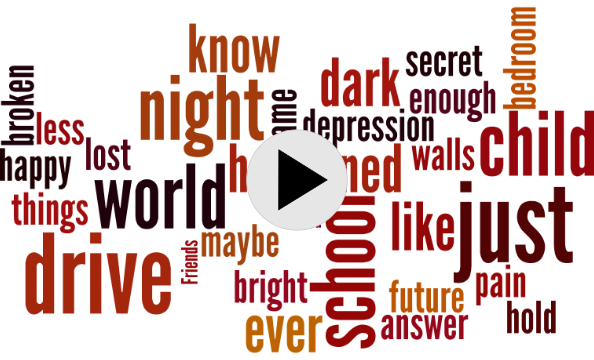Introduction
Imagine a world where everyone is super happy all the time, and people never feel sad! Unfortunately, this isn’t reality. It is estimated that 1 in 4 people suffers with a diagnosable mental health disorder and this number is thought to be much higher in people between the ages of 11 and 25.
Growing up can be filled with many new challenges, such as bodies changing, exam stress, desiring more independence, to name just a few. Coping with a medical condition as well makes is easy to understand why so many young people suffer with mental health issues at some point.
The good news is there is a lot of support out there from health care teams, schools, colleges, universities and organisations specifically there to help people with their mental health.
It is important that people talk, and have open conversations, about mental health. This will make sure that the right support can be provided at the right time and help prevent someone’s mental health getting worse.
What we'll be covering
Talking about mental health
We all talk to release stress and relieve mental burdens. Sometimes we don’t feel like having these conversations perhaps because our mood is low, it takes too much energy or just feels too complicated. It can feel difficult for both young people and adults to start a conversation about mental health.
Adults talking to young people
Talking about mental health with a young person may feel difficult. Maybe you don’t feel equipped with the information that need or you may lack confidence about how to even open up the conversation. You may be concerned that you don’t have all the answers, or that you might say the ‘wrong’ thing which could make matters worse.
But the good news is that, if you are a parent, teacher, health or social care professional, you are used to spending time with young people and are able to use language that they can understand. It’s common to worry about not having enough time to fully explore the issues or offer the right support. But these conversations can be slow and stepwise; sometimes sowing the seeds for future, more detailed and fruitful conversations is the most valuable thing you can do. There are also many excellent resources available to help; some of these are listed at the end of this module.
You cannot force young people to open up about their mental health, but you can encourage them by providing a positive presence, an appropriate environment and encouraging these discussions by building trust. Just by asking ‘How are you’? shows compassion and a willingness to listen.
Young people talking to adults
As a young person, speaking about your mental health may feel very difficult. In addition to all the concerns the adults have, you may be concerned about how the adult will respond or what judgement they may make.
Here are some tips about how to start conversations with adults around mental health:
- Find a way to share and communicate that feels comfortable for you. Start small – you don’t have to have ‘the big conversation’ straightaway.
- Find a time or place that works for you and ‘invite’ an adult to meet you.
- Practice what you want to say and write it down if that feels helpful.
- Think about what may have helped you before and let the adult know about this.
- Think about how you can explain how you are feeling – you might be able to talk about a film, book, blog, Instagram post or even a conversation that could help to explain how you are feeling.
- Be as open and honest as possible.
- Think about what you feel could help – the person you are talking to may not have the answers but may know someone who does.
- Don’t expect too much straight away– talking can help but may not fix things immediately. Don’t be disappointed if you don’t feel ‘better’ right away; every step forward takes you towards your ultimate goal.
- Remember, you can speak to your doctor or nurse in confidence. Sometimes, people worry about upsetting their friends and family when they speak about how bad they are feeling. It may be easier to speak to someone who is not friend or family.
The impact of physical health on mental health
Physical and mental health are closely linked. We are, after all, one whole person and not just a body, or just a mind. This explains why physical health concerns or conditions can affect mental health, for example, long-term conditions such as diabetes, arthritis or asthma can have a significant impact on your mental health, no matter how old you are.
Mental illnesses, such as depression, low mood or anxiety can affect how someone feels about their body and can also cause problems such as headaches, stomach aches, difficulties with sleeping (insomnia), and may lead to more serious physical health issues.
It is easy to see why a healthy mind is a fundamental part of a healthy body and why we must be equally concerned with physical and mental health. Having a long-term physical condition can lead to social isolation, low self-esteem, stigma and discrimination. You may feel tired, frustrated, worried or stressed, especially when dealing with pain, tests, treatments, flare ups, hospital appointments, etc.
Not surprising then, that all of this may lead to mental health issues, such as anxiety or depression. Researchers have found, that people with long-term health conditions are more than twice as likely to develop mental health problems. Poor mental health can then make it harder for you to cope with your physical health challenges.
But, even though mental health challenges are quite common and happen more often to people who have physical health conditions, it is not inevitable that it happens. It can be helpful for clinicians to address this early and explain that it is very common that there may be impact on emotional and mental wellbeing.
Knowing that others often experience the same, that it’s not some weakness on your part and that you do not have to accept poor mental health is important. There is a lot of support out there in addition to what you can do to help yourself.
People with long term conditions want to be seen as more than their condition; they want health professionals to understand that they have lives, dreams, ambitions, families, friends and hobbies. In other words, to understand the bigger picture. There can be times when a long-term condition impacts on life, and times when life impacts on a long-term condition. All healthcare professionals need to consider the impact on mental health and broader psychosocial (life!) factors.
Some people may experience symptoms of depression after being diagnosed with a medical illness. Those symptoms may decrease as the person adjusts to the diagnosis or treatment for the condition. Certain medications used to treat the illness also can trigger depression. It’s important for young people and their clinicians to explore any of these triggers from the outset of providing a diagnosis or starting a medication that might affect someone’s mood.
Some of the challenges young people face
Young people are the future. However, young people also face the future – its opportunities as well as its growing challenges. Facing the future can feel overwhelming as it is not always seen positively. Young people have to navigate a world which can feel insecure, fast moving and frightening with climate change, political changes and changes in society. Never has the future seemed less predictable.
‘More young people than ever are experiencing mental health difficulties. This can affect all areas of their life: home, school, friendships and relationships. There remains a stigma surrounding mental health and it is important that young people understand where to go for support.’
Round Midnight
https://www.roundmidnight.org.uk/understanding-the-challenges-young-people-face-in-2021-and-beyond/.
As a young person – you are not alone! A huge number of young people are concerned about growing up. The top two personal issues of concern for both females and males are coping with stress and school or study problems. For females, the third highest concern was body image, whereas for males it was physical health (www.nspiro.org.au). When young people struggle with their identity it has further impact.
Young people need to work out and accept who they are and often experience intense emotions as their minds and bodies develop. For some, this growing up and transition to adulthood is hard and they may experiment with alcohol, drugs or other substances – all of which can affect mental health in their own right.
Remember that all young people face challenges as they move towards adulthood. People with medical conditions are no different but they usually have other pressures and worries.
Some risk factors can make some children and young people more likely to experience mental health problems; these factors include:
- having a long-term health condition
- a parent who suffers from mental health problems, problems with alcohol or drugs, or who has been in trouble with the law
- parents who separate or divorce
- the death of someone close to them
- being a young carer, such as caring for a relative, having to take on adult responsibilities
- experiencing emotional or physical or sexual abuse
- experiencing discrimination or bullying
- poverty or homelessness
- having difficulties at school which are long-lasting.
What mental health problems commonly occur in in young people?
Researchers have found that some mental health issues are more common in young people. Here are some are basic explanations and definitions from the Mental Health Foundation.
Finding and accessing support
There is plenty of support available for young people with mental health challenges, ranging from self-help to a multitude of charitable organisations specialising in different aspects of mental health.
Self-help
Some of the things that are likely to contribute to good mental health include:
- being in good physical health, which means eating a balanced diet, getting enough sleep and plenty of regular exercise
- having time and freedom to play or relax, indoors and outdoors
- being part of a family that gets along well most of the time
- going to a school that looks after the wellbeing of all its pupils
- taking part in local activities and spend time with friends.
While it is not always possible to change these aspects of life, it is possible for young people at least to talk about the possibility of making changes to include more healthy elements in their lives.
Copying with ups and downs
This short film might give you some more ideas of how to make good choices to promote mental health.
In an emergency
If a young person needs immediate help, for example, if they are having suicidal thoughts, or a psychotic episode, the safest choice is to get the young person to an Emergency Department.
CAMHS
Child and Adolescent Mental Health Services, or in short CAMHS, is a free NHS service for children and young people under the age of 18 years. It is sometimes called CYPMHS, which stands for Children and Young People’s Mental Health Services. From age 18 years onwards, referral needs to be made to Adult Mental Health Services (AMHS).
Your general practitioner or hospital doctor can refer you to CAMHS for support, if you are suffering from mental health issues, such as anxiety, panic attacks, depression, hearing voices, self harm or if you are having suicidal thoughts.
CAMHS services work in teams with therapists, psychologists, nurses, support workers, social workers, child and adolescent psychiatrists (doctors who are specialised in mental health) and other professionals.
This is the go-to organisation for most healthcare and education professionals for additional mental health support. It can be a scary step to take, but everyone involved is there to help.
Other mental health support
Many schools have good counselling and support or key worker services, which can be very helpful if a young person is going through a difficult time.
Clinical psychologists may be working with your healthcare team and can provide very helpful support in dealing with the impact of having a long-term physical health condition.
'Depression is more common in children and young people today than in the last decades. Young people are more likely to experience depression than young children.
Self-harm is a very common problem among young people. Some people who experience intense emotional pain may try to deal with it by hurting themselves.
Generalised anxiety disorder can cause young people to become extremely worried. Very young children or children starting or moving school may have separation anxiety.
Post-traumatic stress disorder (PTSD) can follow physical or sexual abuse, witnessing something extremely frightening or traumatising, being the victim of violence or severe bullying or surviving a disaster.
Young people who are consistently overactive, impulsive and have difficulty paying attention may have attention deficit hyperactivity disorder (ADHD).
Eating disorders usually start in the teenage years and are more common in girls than boys. The number of young people who develop an eating disorder is small but eating disorders such as anorexia nervosa and bulimia nervosa can have serious consequences for physical health and development.'
The Mental Health Foundation
https://www.mentalhealth.org.uk/
Lived experience
Stories are a powerful way of learning and can help put your learning into context.
Watch or listen to the story below and think about it relates to the material in this module.
And so, we drive
Summary
You should now feel more confident about:
- the impact of mental health on young people and, more specifically, those with long-term medical conditions
- the importance of establishing positive relationships between young people and the adults around them to open up conversations and provide a safe environment to explore feelings
- the challenges and demands young people face growing up in today’s complicated society
- what information, help and support are available.
If you want to know more...
There are plenty of ways to find out more. One great one is to use your NHS account to access services online on your computer, tablet or mobile phone.
Find more information on the 11to25hub
Why not dip into one of our other modules, where you can find out about other aspects of healthcare transition in more detail.
Bust the jargon!
Whether you’re a young person, a parent or a professional you’ll have realised that there’s a lot of jargon in the health and social care systems. This jargon buster from Think Local Act Personal may help. Just type in a term…
External resources
Here are some more resources that you may find helpful, engaging and informative:
- Young Minds is an independent charity for children, young people and their parents. It offers support to young people coping with mental health issues and to parents or carers who are worried about young people they support
- Best For You exists to make it easier for you to find the support you need. It includes information about mental health, digital tools for anyone in the UK, and personalised mental health services for young people in North-West London
- The Centre for Mental Health has a searchable page of publications
- Mental Health for All England provide useful resources including interactive toolkits, strategic guidance, posters and more
- The Prince’s Trust has an informative list of resources.
How useful was this page?
Click on a star to rate it!
Average rating 5 / 5. Vote count: 4


